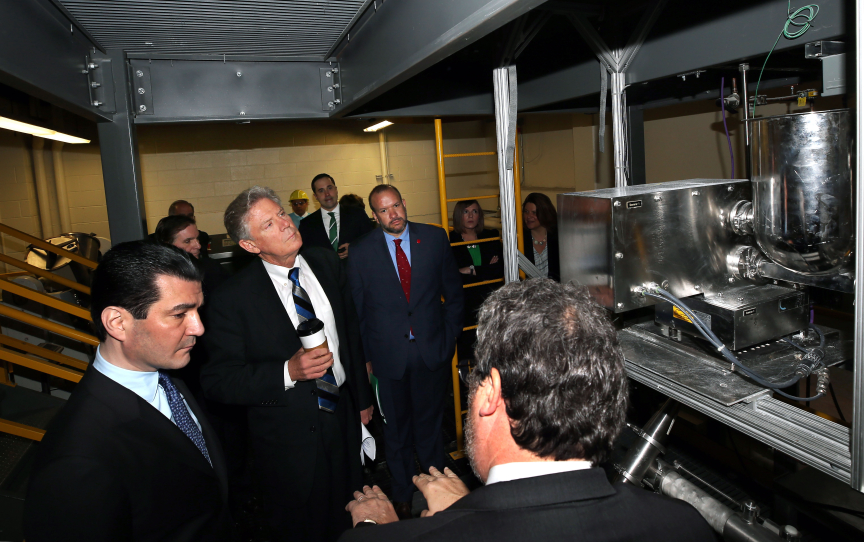Supporting a Better Way to Manufacture Pharmaceuticals
Pallone introduces legislation for FDA, universities to partner on pioneering technology

U.S. Rep. Frank Pallone, Jr., D-N.J., introduced legislation this week with Rep. Brett Guthrie, R-Ky, that would allow designated universities, including Rutgers University, to partner with the Food and Drug Administration (FDA) and industry to further develop and implement a faster, more efficient pharmaceutical manufacturing process.
The legislation would authorize $80 million in funding for the effort and would allow the FDA to partner with and designate universities as National Centers of Excellence in Continuous Pharmaceutical Manufacturing. The designated universities would work with the FDA and the pharmaceutical industry to further develop and implement continuous manufacturing technology to improve product quality, reduce errors and help prevent drug shortages.
“Continuous pharmaceutical manufacturing is the future of medicine,” said Pallone, chair of the House Energy and Commerce Committee. “This bipartisan legislation will foster the development of the emerging technology by expanding opportunities for the FDA to partner with universities across the country that are leading these efforts, including Rutgers University in my congressional district.”
Drug manufacturing has changed very little in 50 years, with most companies still using “batch” manufacturing techniques that can be inefficient, slow and may be subject to risk of defects or errors during the manufacturing process. Pharmaceuticals made using continuous manufacturing are moved nonstop through a facility, saving time, reducing the likelihood of human error and providing a better system for responding nimbly to market needs.
The technology also could allow more production sites to be U.S.-based, creating new jobs, reducing the need for transcontinental shipping and helping prevent future drug shortages, Pallone said.
“Implementation of continuous pharmaceutical manufacturing represents a unique opportunity to reduce manufacturing costs, improve product quality, protect the U.S. patient population and create high-wage manufacturing jobs in an industry that is vital to every American citizen," said Fernando Muzzio, director of C-SOPS and Distinguished Professor of Chemical and Biochemical Engineering at Rutgers-New Brunswick, who praised Pallone’s leadership in the effort.
"The proposed centers of excellence, if properly implemented, will enable the American economy to receive the full benefits of breakthrough manufacturing technologies that were conceived, demonstrated and first implemented in American universities and American companies," Muzzio said.
Last year, Pallone visited Rutgers with then-FDA Commissioner Scott Gottlieb to tour the Center for Structured Organic Particulate Systems (C-SOPS). The university center has played a leading role in the advancement of continuous manufacturing technology.
Pallone also authored legislation that was signed into law as a part of 21st Century Cures Act authorizing the FDA to issue grants to institutions of higher education and nonprofit organizations to study and make recommendations regarding improvements to the process of continuous manufacturing of drugs and biologics.
Founded in 2006, C-SOPS brings together a cross-disciplinary team of researchers from major universities to work closely with industry leaders and regulatory authorities to improve the way pharmaceuticals, foods and agriculture products are manufactured. In addition, the center provides opportunities for students to participate in projects that will prepare them for careers as industry leaders of the future.
Headquartered at Rutgers University, C-SOPS partners include the New Jersey Institute of Technology, Purdue University, the University of Puerto Rico at Mayaguez and more than 40 industrial consortium member companies.